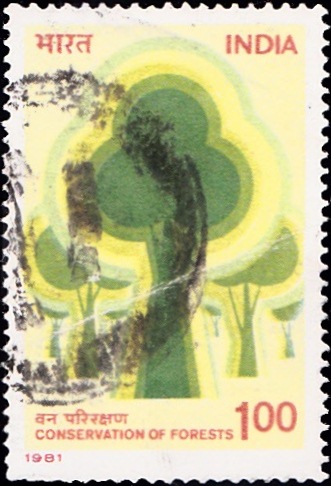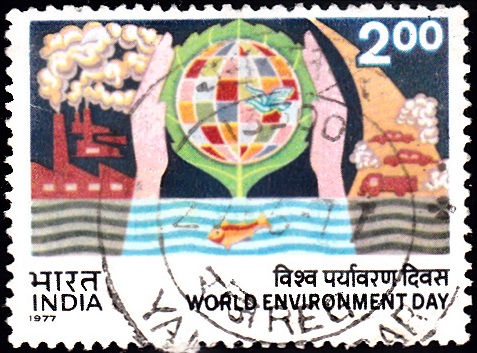
India on Environmental Conservation 1981
A commemorative postage stamp on the World Environment Day : Conservation of Forests :
 Issued by India
Issued by India
Issued on Jun 15, 1981
Issued for : Indian P & T Department is privileged to issue a special stamp on the World Environment Day highlighting the need for conservation of forests which is an integral and significant component in environmental conservation.
Designed by : M. K. Bardhan
Type : Stamp, Postal Used
Colour : Multicolour
Denomination : 100 Paise
Overall size : 4.06 x 2.75 cms.
Printing size : 3.70 x 2.40 cms.
Perforation : 14½ x 14
Paper : Printed on unwatermarked adhesive stamp paper
Number printed : 20,00,000
Number per issue sheet : 40
Printing process : Photogravure
Printed at : India Security Press
About :
- Environmental Conservation involves protection as well as enhancement of the quality of our natural environment. Natural resources are the basic building blocks for national development. The air, water, soil, flora and fauna have to be used with care and wisdom to sustain development and to provide for improved quality of life for the people.
- India is one of the few countries to have specifically referred to the need for environmental protection in its Constitution. The Directive Principles of State Policy enjoins, “the State shall endeavour to protect and improve the environment and to safeguard the forests and wildlife of the country” (Article 48). It also declares, “it shall be the duty of every citizen of India to protect and improve the natural environment including forests, lakes, rivers, wildlife, and to have compassion for living creatures” (Article 51-A). With the growing pressure on our natural resources from human and animal populations, environmental degradation is evident in different parts of the country. Signs of deterioration can be seen along the sub-Himalayan tracts, the Western Ghats, the forests of peninsular India and some coastal areas.
- In recent years, considerable public concern has been generated in India on the adverse impact of various developmental projects like multipurpose river valley schemes, petrochemical refineries, fertilizer plants, thermal power stations, etc. on environmental resources. Though such projects are beneficial to the economic development of the nation, they have often been the cause of environmental pollution, deforestation and soil erosion.
- Till recently the National Committee on Environmental Planning and Coordination, set up by the Government of India in 1972, was entrusted with the planning for sound environmental development. Since 1 November 1980, a separate Department of Environment has been created, under the charge of the Prime Minister for the pivotal role of environmental conservation in the context of national development. This department together with other supporting organisations, has the responsibility for coordinating and sponsoring environmental protection programmes in the country. It also supports development programmes undertaken by agencies within and outside the Government.
- (Text : Courtesy of Department of Environment, Government of India).
Subscribe
Login
0 Comments
Oldest







